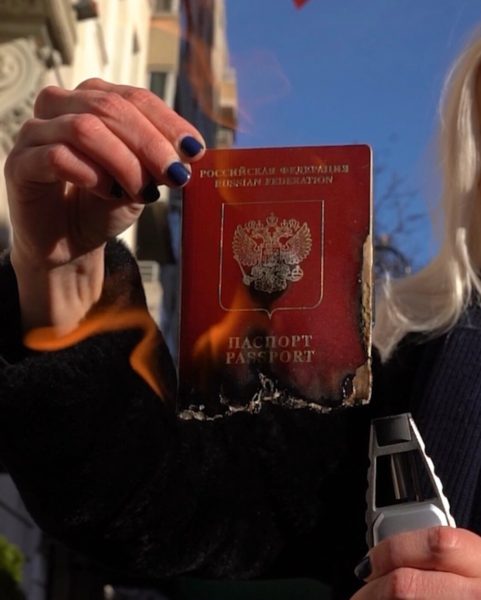NFT artist Olive Allen said by publicly burning her Russian passport, protesting the current government. Allen said she will use funds from the sale to donate to Save the Children, an organization aimed at helping children around the world.
Olive Allen, a Russian national and artist who has lived in the USA for more than 11 years, has burned her mother country’s passport in the hopes of raising awareness and funds related to the military conflict in Ukraine.
Speaking to Cointelegraph on Friday, Allen described herself as “a child of new Russia” and said the country would always be a part of her identity, but she had chosen to cut ties with it based on its recent actions in Ukraine. Standing in front of the Consulate General of the Russian Federation in New York City, Allen burned her Russian passport — which she said was the only copy she had — and planned to auction the video as a nonfungible token (NFT), with the proceeds going to humanitarian efforts in Ukraine.

“I do not consider Putin’s Russia my home,” said Allen. “Our country has such an immense potential, but the government has been f—ing people over for eternity.”
Allen, who has been involved in the crypto space since early 2018 following the December 2017 Bitcoin (BTC) bull run, said the decision to burn her passport was prompted by being unable to see herself ever returning to the country under its current leadership. She said she wanted to push back against the narrative that all Russian civilians were in favor of military action against Ukraine, noting she knew people in the country who were “brainwashed to the point of no return” in supporting the regime.
“I love my country but I do not believe in Putin’s Russia. I don’t see myself living there in the current situation. What’s happening right now is just heartbreaking.”
The auction of her burning passport NFT went live on the SuperRare marketplace on Friday. Allen said she will use funds from the sale to donate Ether (ETH) directly to Save the Children, an organization aimed at helping children around the world with issues such as trafficking, early marriage, being unable to obtain an education, and fleeing from violence.
Allen said she wanted to focus on sending funds to humanitarian efforts rather than the military. Save the Children is currently accepting crypto donations through the nonprofit fundraising platform Giving Block in BTC and ETH for the roughly 7.5 million children “caught in the crossfire of war” in Ukraine. The NFT artist said by publicly burning her passport, she was effectively making it dangerous to repatriate by making her views on the government known.
“I could never return to Russia with the current regime — I’ll be arrested right away,” said Allen. “People go to jail in Russia for less. I’ve cut off my chances of coming back, I mean at least during the current regime.”
Meanwhile, according to CNBC, donations in cryptocurrencies are pouring into Ukraine as the war with Russia enters its second week.
Since Moscow invaded on February 24, more than 102,000 cryptoasset donations, totaling $54.7 million, have gone to the Ukrainian government and Come Back Alive, an NGO providing support to the military, according to new data from blockchain analytics firm Elliptic. The raise includes a single donation of $5.8 million from Gavin Wood, the founder of a lesser-known cryptocurrency called Polkadot (DOT).
Donations have picked up this week, with around 72,000 of these donations coming in the past two days. Thus far, the contributions consist of $18.2 million in Ether (ETH), $17.2 million in Bitcoin (BTC), and $9.5 million in a mix of US dollar-pegged stablecoins, including an anonymous donation of $1 million in Tether (USDT), and even Dogecoin (DOGE).
Accepting donations in crypto is new for the Ukrainian government. Up until Saturday, all donations had to travel via traditional payment channels, but on February 26, the government decided to get creative.
Twitter accounts belonging to the Ukrainian government began to solicit cryptoasset donations for the first time. The move came after the country’s central bank cracked down on digital money transfers in connection with a nationwide declaration of martial law.



